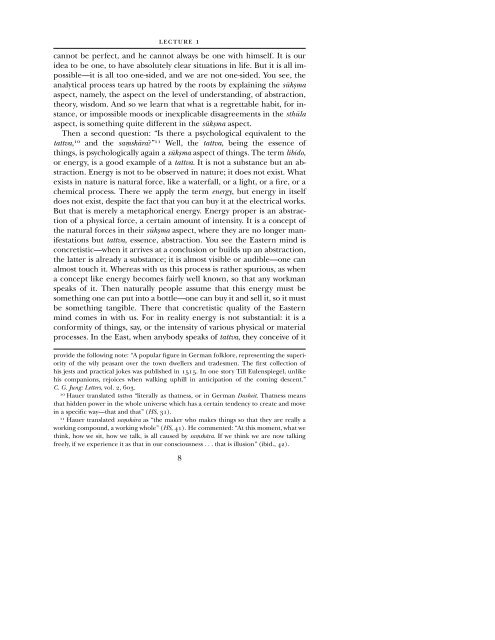CG JUNG - Countryside Anarchist
CG JUNG - Countryside Anarchist
CG JUNG - Countryside Anarchist
Create successful ePaper yourself
Turn your PDF publications into a flip-book with our unique Google optimized e-Paper software.
LECTURE 1<br />
cannot be perfect, and he cannot always be one with himself. It is our<br />
idea to be one, to have absolutely clear situations in life. But it is all impossible—it<br />
is all too one-sided, and we are not one-sided. You see, the<br />
analytical process tears up hatred by the roots by explaining the sÖküma<br />
aspect, namely, the aspect on the level of understanding, of abstraction,<br />
theory, wisdom. And so we learn that what is a regrettable habit, for instance,<br />
or impossible moods or inexplicable disagreements in the sthÖla<br />
aspect, is something quite different in the sÖküma aspect.<br />
Then a second question: “Is there a psychological equivalent to the<br />
tattva, 10 and the saôskvra?” 11 Well, the tattva, being the essence of<br />
things, is psychologically again a sÖküma aspect of things. The term libido,<br />
or energy, is a good example of a tattva. It is not a substance but an abstraction.<br />
Energy is not to be observed in nature; it does not exist. What<br />
exists in nature is natural force, like a waterfall, or a light, or a fire, or a<br />
chemical process. There we apply the term energy, but energy in itself<br />
does not exist, despite the fact that you can buy it at the electrical works.<br />
But that is merely a metaphorical energy. Energy proper is an abstraction<br />
of a physical force, a certain amount of intensity. It is a concept of<br />
the natural forces in their sÖküma aspect, where they are no longer manifestations<br />
but tattva, essence, abstraction. You see the Eastern mind is<br />
concretistic—when it arrives at a conclusion or builds up an abstraction,<br />
the latter is already a substance; it is almost visible or audible—one can<br />
almost touch it. Whereas with us this process is rather spurious, as when<br />
a concept like energy becomes fairly well known, so that any workman<br />
speaks of it. Then naturally people assume that this energy must be<br />
something one can put into a bottle—one can buy it and sell it, so it must<br />
be something tangible. There that concretistic quality of the Eastern<br />
mind comes in with us. For in reality energy is not substantial: it is a<br />
conformity of things, say, or the intensity of various physical or material<br />
processes. In the East, when anybody speaks of tattva, they conceive of it<br />
provide the following note: “A popular figure in German folklore, representing the superiority<br />
of the wily peasant over the town dwellers and tradesmen. The first collection of<br />
his jests and practical jokes was published in 1515. In one story Till Eulenspiegel, unlike<br />
his companions, rejoices when walking uphill in anticipation of the coming descent.”<br />
C. G. Jung: Letters, vol. 2, 603.<br />
10 Hauer translated tattva “literally as thatness, or in German Dasheit. Thatness means<br />
that hidden power in the whole universe which has a certain tendency to create and move<br />
in a specific way—that and that” (HS, 31).<br />
11 Hauer translated saôskvra as “the maker who makes things so that they are really a<br />
working compound, a working whole” (HS, 41). He commented: “At this moment, what we<br />
think, how we sit, how we talk, is all caused by saôskvra. If we think we are now talking<br />
freely, if we experience it as that in our consciousness . . . that is illusion” (ibid., 42).<br />
8


